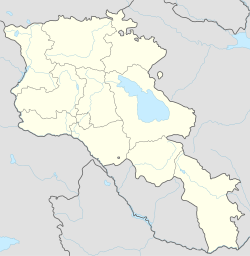Karbi, Armenia
| Karbi Կարբի |
|
|---|---|

The road leading to the village
|
|
| Coordinates: 40°19′52″N 44°22′35″E / 40.33111°N 44.37639°ECoordinates: 40°19′52″N 44°22′35″E / 40.33111°N 44.37639°E | |
| Country | Armenia |
| Marz (Province) | Aragatsotn |
| Population (2008) | |
| • Total | 3,825 |
| Time zone | (UTC+4) |
| • Summer (DST) | (UTC+5) |
Karbi (Armenian: Կարբի) is a village in the Aragatsotn Province of Armenia situated near the town of Ashtarak. Within the area is a triple-nave basilica of S. Astvatsatsin dated to 1691-93 with an unattached adjacent belfry of 1338. In the village are also S. Gevorg or S. Kiraki church of the 11th to 13th centuries, Tsiranavor, a Tukh Manuk shrine, and "Zargarents Jam" chapel built between the 11th and 13th centuries.
Karbi was recorded in manuscripts as early as the 13th century and is also mentioned in an inscription of the same period upon the southern wall of the Katoghike Church of the Astvatsnkal Monastery built between the 5th and 13th centuries. It reads,
By the grace and mercy of God, I Kurd, Prince of Princes, son of the great Vache, and my wife Khorishah, daughter of Marzpan, built the Holy Katoghike for the memory of our souls. We have decorated it with every kind of precious ornament and offered the garden bought by us in Parpi, virgin land in Oshakan, a garden in Karbi, a villager (?), and three hostels, in the year 693/AD 1244.
The history of Karbi has been one marked by invasions, destruction and plundering. In the manuscripts (late 14th to mid-15th centuries) written by Thomas of Metsoph, he left an account of the invasions of Timur Lenk in the 14th century and stated that, "Next [Timur] came to the Araratean country and Karbi and the Kotayk country." During this time, development in the village was suspended.
In the first half of the 17th century, Karbi was severely damaged in the Perso-Turkish wars. After the period of peace ensuing in 1639, restoration of the buildings began and trade broadened.
In 1724, the Ottoman military commanders Güç Ali and Yalguz Hasan were dispatched under the orders of Abdullah Pasha to advance and lay siege to Karbi, and plunder the village and enslave its inhabitants. Each of the leaders originally had under their command approximately 1,800 soldiers, and had suffered high casualties during their advance on the city of Yerevan at a battle near Yeghvard in March 1724.
...
Wikipedia

